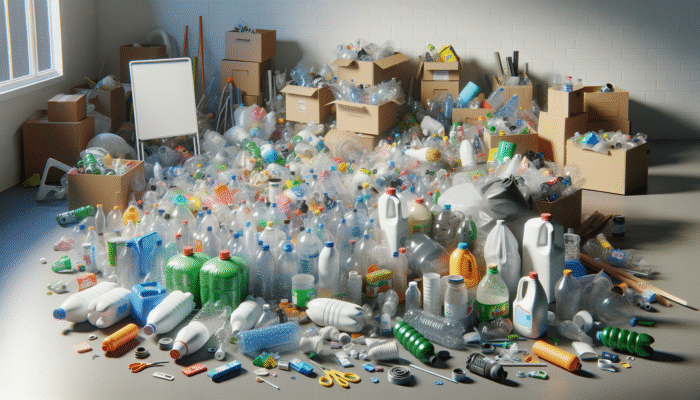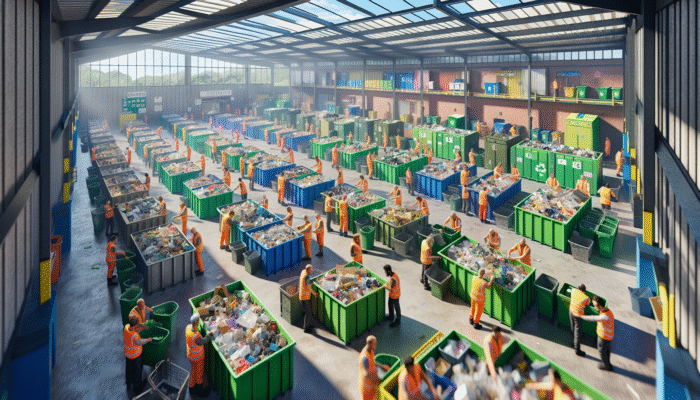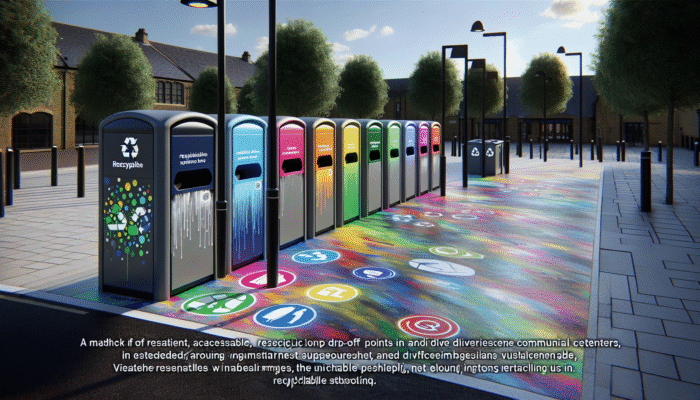Your Comprehensive Guide to Understanding Plastic Varieties in UK House Clearances
Recognising Common Plastic Types Encountered in House Clearances

Plastics are integral to our everyday existence, appearing in a myriad of forms and serving critical functions in various applications. During house clearances in the UK, you are likely to come across a multitude of plastic types such as Polyethylene Terephthalate (PET), High-Density Polyethylene (HDPE), and Polyvinyl Chloride (PVC). Understanding these different plastic types is crucial, as each one has its unique recycling criteria and environmental impacts. For example, PET is frequently found in soft drink bottles and has a commendable recycling recovery rate, making it one of the most widely recycled plastics. HDPE, commonly used in items like milk jugs and detergent bottles, also benefits from a respectable recycling rate due to its durability. Conversely, PVC, often seen in plumbing pipes and vinyl flooring, poses more significant recycling challenges due to its intricate material composition.
By expanding your understanding of these various plastic types, you equip yourself to make informed choices during house clearances. For instance, recognising that HDPE can be recycled into new containers, pipes, or even plastic lumber encourages responsible disposal practices. Proper identification of these plastics streamlines the recycling process, enabling you to actively contribute to reducing the plastic waste that accumulates in landfills and oceans. This, in turn, supports the ongoing battle against plastic pollution in the UK.
Maximising Recycling Efficiency Through Effective Plastic Sorting Strategies
Effective sorting of plastics is a fundamental aspect of the recycling process, particularly during recycling plastics in UK house clearances. When various plastic types are combined, their distinct properties can impede effective recycling efforts and often result in contamination. Contaminated materials frequently end up in landfills, negating the advantages of recycling. By diligently sorting plastics according to type, you can greatly enhance recycling efficiency and minimise overall waste.
In recent times, the UK has made significant progress in promoting effective plastic sorting through public awareness campaigns and educational initiatives. Residents are encouraged to segregate plastics from other waste materials and adhere to local recycling guidelines. For instance, local councils generally provide clear and comprehensive instructions detailing which plastics are accepted at local recycling centres. Prioritising meticulous sorting not only boosts recycling rates but also conserves essential resources and energy, thereby rendering the entire waste management process more sustainable and environmentally friendly.
Decoding Plastic Labelling Systems for Optimised Recycling Practices
Grasping the plastic labelling systems utilised in the UK is crucial for effective recycling. The identification codes, typically found on the bottom of plastic containers, indicate the type of plastic and its recyclability. For instance, a ‘1’ denotes PET, while a ‘2’ indicates HDPE. These codes are invaluable for both consumers and recycling facilities, as they streamline the sorting and processing phases of recycling.
Local councils frequently offer clear directives regarding the acceptability of various labelled plastics. However, not all labelled plastics are recyclable in every locality, making it essential to consult local guidelines. Familiarising yourself with these labels enables individuals to make educated decisions during the disposal process, ultimately enhancing the success of recycling plastics during UK house clearances. Understanding the labelling system extends beyond recycling; it raises awareness about the lifecycle of plastic products and fosters a culture of sustainability.
Exploring Recycling Facilities and Services Available Across the UK

Utilising Local Council Recycling Centres for Sustainable Plastic Disposal
Identifying and leveraging local council recycling centres is a crucial step towards responsible plastic disposal in the UK. These facilities offer a convenient and environmentally sustainable method for disposing of plastics that cannot be collected via regular household waste services. Each local council has specific guidelines concerning the types of plastics accepted, typically organised by the previously discussed plastic categories.
To find your nearest recycling centre, visit your local council’s website, which usually includes maps and detailed information about accepted materials. Many centres feature dedicated bins for various plastic types, ensuring efficient sorting upon arrival. Engaging with local council services not only amplifies your recycling efforts but also positively influences your community’s sustainability initiatives, fostering a collective sense of responsibility towards environmental stewardship.
Moreover, some councils have introduced curbside collection services that simplify the recycling process for residents. By participating in these services, households can significantly diminish their plastic footprint and motivate others to do the same. This, in turn, nurtures a culture of recycling within their community and promotes sustainable living practices.
Understanding the Role of Private Recycling Companies in Plastic Waste Management
Private recycling companies are integral to the UK’s strategy for effective plastic waste management. Unlike local councils, these companies often specialise in specific types of plastics or provide comprehensive services that encompass collection, sorting, and processing. This level of specialisation can lead to enhanced recycling rates and reduced contamination levels, significantly improving the overall efficiency of recycling systems.
For instance, certain private firms focus exclusively on commercial plastic waste, offering tailored solutions to meet the unique needs of businesses. They utilise innovative technologies and methodologies to ensure that plastics are recycled efficiently and responsibly. By collaborating with these companies, households can ensure their plastic waste is managed effectively and sustainably, contributing to a cleaner environment.
Researching and selecting a reputable private recycling company can greatly influence the success of your recycling initiatives. Many of these firms also provide educational resources, workshops, and community outreach programmes that raise awareness about the importance of recycling and responsible waste management practices, fostering a culture of sustainability across communities.
Convenient Recycling Drop-off Points for Efficient Plastic Disposal

In addition to local council recycling centres, recycling drop-off points offer a convenient option for individuals seeking to dispose of plastics efficiently. These drop-off locations are strategically positioned across the UK, often found in supermarkets, community centres, or designated recycling hubs. They provide a flexible solution for those who may lack access to kerbside collection services or prefer recycling at their convenience.
Drop-off points typically feature clearly marked bins for various recyclable items, including plastic bottles and containers. By using these locations, residents can ensure their plastic waste is recycled appropriately, preventing it from contributing to landfill overflow. It is vital to verify local guidelines to ascertain which types of plastics are accepted at specific drop-off sites, ensuring compliance with recycling protocols.
Participating in drop-off initiatives can also enhance community involvement and raise awareness regarding the significance of recycling. Numerous local councils and organisations host campaigns to encourage residents to incorporate recycling into their daily routines, contributing to the overarching goal of reducing plastic waste throughout the UK.
Empowering Communities Through Innovative Recycling Initiatives
Community-driven recycling initiatives are increasingly gaining traction across the UK, focusing on sustainable plastic waste management and emphasising the importance of recycling plastics during UK house clearances. These initiatives often involve collaboration among local councils, businesses, and residents to develop effective recycling programmes tailored to the specific needs of various communities.
One exemplary initiative is the establishment of community recycling workshops, where residents are educated about the recycling process, the importance of material sorting, and best practices for minimising plastic waste. These educational sessions empower individuals to take ownership of their recycling efforts, promoting engagement from all household members and fostering a collective sense of community responsibility.
Additionally, some communities have initiated sharing schemes or upcycling projects that transform discarded plastics into valuable resources or products. This creative approach not only reduces plastic waste but also cultivates a sense of community spirit and accountability. By taking part in such initiatives, residents contribute to a circular economy where materials are continuously reused and recycled, ultimately benefiting both the environment and the local economy.
Legal Framework and Environmental Concerns Surrounding Plastic Recycling
Navigating UK Waste Management Regulations to Promote Sustainable Disposal Practices
Understanding the UK waste management regulatory landscape is essential for ensuring that plastic disposal practices are both legal and environmentally responsible. The UK government has established a comprehensive set of regulations aimed at minimising waste and encouraging recycling, including the Waste (England and Wales) Regulations 2011 and the Environment Act 2021. These regulations provide clear guidelines for both businesses and households regarding the appropriate disposal of plastics.
Being familiar with these regulations helps individuals and organisations maintain compliance while promoting environmentally friendly practices. For example, businesses are mandated to follow specific waste management protocols, ensuring that waste is recycled appropriately rather than sent to landfills without adhering to proper procedures. Non-compliance with these regulations can lead to hefty penalties, underscoring the necessity of awareness and education regarding waste management laws and practices.
For households, understanding local council waste disposal policies is imperative. Many councils provide accessible resources detailing accepted materials, recycling procedures, and penalties for improper disposal. Engaging with these regulations not only safeguards the environment but also ensures that you positively contribute to your community’s waste management efforts, fostering a culture of sustainability.
Evaluating the Environmental Impact of Plastic Waste
The environmental consequences of plastics are extensive and significant, highlighting the urgent need for effective recycling practices in the UK. Plastics, particularly single-use items, substantially contribute to pollution and pose severe threats to marine ecosystems. By comprehending the implications of plastic waste, individuals can make informed choices regarding their consumption and disposal behaviours.
Recycling is critical in mitigating the adverse effects of plastic waste. Through recycling, we conserve natural resources, decrease energy consumption, and reduce greenhouse gas emissions associated with plastic production and disposal. Furthermore, recycling alleviates pressure on landfills and the environment, promoting a more sustainable future for everyone.
Awareness campaigns and educational initiatives are vital for fostering a culture of environmental responsibility. Local councils, non-profit organisations, and educational institutions are increasingly investing in public outreach efforts to highlight the significance of recycling plastics and the broader ramifications of plastic pollution. By participating in these initiatives, individuals contribute to a collective movement towards a cleaner, greener future for the UK.
Understanding Penalties for Improper Plastic Disposal Practices
Awareness of the penalties and fines associated with improper plastic disposal in the UK is essential in promoting responsible waste management practices. Local councils possess the authority to impose fines on individuals and businesses that breach waste disposal regulations. For instance, littering or unlawfully discarding plastics can result in notable fines, serving as a strong deterrent against careless disposal practices that are harmful to the environment.
Beyond financial penalties, improper disposal can yield long-lasting consequences for communities and ecosystems. Contaminated waste complicates recycling efforts, leading to increased costs and decreased efficiency within local waste management systems. Moreover, the environmental damage caused by plastic pollution can have irreversible effects on wildlife and ecosystems, further emphasising the necessity for responsible disposal practices.
Educating residents about the potential repercussions of improper disposal fosters a sense of accountability and encourages responsible behaviour. Community-driven initiatives and public campaigns can play a pivotal role in raising awareness about the importance of adhering to waste management regulations. By taking responsibility for their waste, individuals can positively impact both their community and the environment, nurturing a culture of sustainability.
Optimising Strategies for Plastic Recycling in UK Households
Essential Steps for Properly Preparing Plastics for Recycling
Preparing plastics for recycling is not merely a best practice; it is essential for boosting the efficiency of recycling plastics in UK house clearances. To ensure that plastic items are recycled correctly, they must be clean, dry, and devoid of contaminants. This process involves rinsing containers to eliminate any food or liquid residues and ensuring that all labels or non-plastic components are discarded before disposal.
A prevalent misconception is that greasy or dirty plastics can still be recycled; however, this is a fallacy. Contaminated plastics can lead to entire batches of recyclables being deemed non-recyclable, ultimately increasing landfill waste and undermining recycling efforts. By cultivating a habit of cleaning and preparing plastics prior to disposal, households can significantly enhance the effectiveness of recycling initiatives and support environmental sustainability.
Moreover, educating all household members about proper preparation techniques is crucial for instilling a culture of recycling. Simple practices, such as designating a specific area in the kitchen for rinsing and drying plastics, can encourage family involvement in recycling initiatives. This collective effort can lead to a more sustainable household and a more significant impact on community recycling rates, underscoring the importance of responsible waste management.
Implementing Efficient Storage Solutions for Plastics Before Disposal
Proper storage of plastics prior to disposal is a vital component of responsible recycling practices in UK households. Establishing a designated area for collecting recyclables is essential, ensuring that plastics are stored cleanly and securely until they are ready for disposal. This not only helps maintain an organised living space but also encourages ongoing participation in recycling efforts, promoting a culture of responsibility within the household.
Using clear bins or containers can facilitate the sorting process, making it easier to separate different types of plastics. Labelling these containers appropriately—such as “PET,” “HDPE,” or “Other”—can also assist family members in identifying which plastics belong where, ultimately streamlining the recycling process and improving recycling outcomes.
Additionally, timing is critical regarding the storage of plastics. Regularly emptying the collection bins ensures that they do not overflow, which may lead to contamination and encourage improper disposal. By consistently monitoring and managing your storage practices, you can play a pivotal role in enhancing the efficiency of recycling plastics in UK house clearances, contributing to a cleaner environment and a more sustainable future.
Strategies to Foster Household Engagement in Recycling Initiatives
Encouraging participation from all household members in plastic recycling initiatives is essential for nurturing a culture of responsibility and sustainability. Involving everyone in the recycling process not only aids in improving recycling rates but also educates younger generations about the significance of responsible waste management practices.
One effective strategy is to include family members in discussions regarding recycling habits. Talking about the importance of recycling and allowing everyone to contribute ideas can lead to increased buy-in and enthusiasm for recycling initiatives. Furthermore, implementing gamification techniques can effectively motivate participation; for example, setting monthly recycling goals and rewarding the household for achieving them can create a sense of achievement and teamwork.
Providing educational resources, such as pamphlets or links to online materials, can also enhance understanding of the recycling process and its environmental impact. By making recycling a shared family responsibility, you empower individuals to take ownership of their actions, leading to more engaged and environmentally conscious citizens committed to sustainability and responsible waste management.
Showcasing Successful Case Studies of Plastic Recycling Innovations in the UK
Community-Led Recycling Initiatives Making a Significant Difference
Exploring successful community-driven plastic recycling initiatives in the UK illustrates the power of collaboration and local efforts in combatting plastic waste. A notable example is the ‘Plastic Free Communities’ initiative, which encourages local groups to work together to minimise reliance on single-use plastics. Through the establishment of ‘Plastic Free Champion’ programmes, communities can devise action plans that focus on reducing plastic waste while promoting sustainable alternatives.
These initiatives often involve partnerships with local businesses, councils, and educational institutions, creating a comprehensive approach to waste reduction. Events such as community clean-up days and workshops educate residents about the importance of recycling and responsible waste disposal. The ripple effect of these initiatives can foster lasting changes in community behaviour, nurturing a culture of sustainability that extends beyond the immediate project and inspires ongoing participation.
Another inspiring example is the emergence of community recycling hubs, where residents can drop off plastics for recycling and learn about upcycling and other waste reduction strategies. These hubs not only provide essential services but also serve as educational centres, empowering individuals to proactively reduce their plastic footprint and contribute to a more sustainable future.
Innovative Business Recycling Programmes Transforming Practices Across the UK
Businesses throughout the UK are increasingly recognising the importance of implementing effective plastic recycling programmes as part of their corporate responsibility. Many companies have adopted comprehensive waste management strategies that prioritise recycling and sustainability. This shift is driven by consumer demand for eco-friendly practices and heightened awareness of corporate social responsibility.
Major retailers, for instance, have established in-store recycling schemes that allow customers to return plastic packaging for proper recycling. Initiatives like these not only support local recycling efforts but also encourage customers to engage with sustainable practices. Furthermore, businesses actively promoting recycling initiatives often attract environmentally conscious consumers, positively impacting their brand image and fostering customer loyalty.
Additionally, many companies are now focusing on minimising plastic usage by introducing reusable alternatives, such as bulk bins for grains or liquids instead of single-use plastic packaging. Such innovations not only reduce plastic waste but also promote a shift towards more sustainable consumer habits, ultimately benefiting both the environment and the economy.
Government-Funded Projects Enhancing National Recycling Efforts
Government-funded initiatives aimed at improving plastic recycling in the UK are paving the way for more effective waste management solutions. Projects like the ‘Resources and Waste Strategy for England’ outline ambitious targets to eliminate avoidable plastic waste and promote recycling. These strategies frequently include funding for local councils to enhance recycling infrastructure and public awareness campaigns.
For instance, the recent expansion of the ‘Plastic Pact’ encourages businesses to commit to making packaging recyclable, reusable, or compostable by 2025. Such collaborative projects create a unified front, bringing together stakeholders from multiple sectors to address the plastic crisis in a cooperative and effective manner.
Moreover, these government initiatives often allocate funds for research into advanced recycling technologies and methods. By investing in innovation, the UK aims to maintain its position at the forefront of sustainable plastic management, ultimately contributing to a greener future and enhancing overall recycling capabilities.
The Impact of Educational Campaigns on Recycling Awareness
Educational campaigns are crucial for raising awareness and promoting plastic recycling among the public and educational institutions in the UK. Initiatives like ‘Recycle Now’ provide valuable resources for individuals and families to comprehend the significance of recycling and how to do it effectively. These campaigns often utilise various media platforms to engage diverse audiences, ensuring widespread participation and involvement.
In schools, programmes emphasising environmental education encourage students to take an active role in recycling efforts. Many institutions implement recycling clubs and sustainability projects that empower students to lead initiatives within their communities. This hands-on experience not only cultivates a sense of responsibility but also equips young individuals with the knowledge and skills necessary to advocate for sustainable practices in their future careers, nurturing a generation committed to environmental stewardship.
By integrating educational initiatives into community and school settings, the UK can foster a culture of recycling and environmental responsibility that lasts for generations. The benefits of such programmes extend beyond immediate waste reduction; they cultivate a generation dedicated to sustainability, ultimately paving the way for a cleaner and greener planet.
Confronting Challenges and Developing Solutions in UK Plastic Recycling
Tackling Contamination Issues in Recycling Processes
Contamination challenges pose one of the primary hurdles faced by plastic recycling efforts in the UK. Contaminated recyclables, often resulting from residues of food or non-recyclable materials mixed in, can lead to entire batches being rejected at recycling facilities. This not only squanders valuable resources but also diminishes the overall efficiency of recycling systems, making it essential to address these challenges proactively.
To combat contamination issues, a multi-faceted approach is required. Public education campaigns are vital for informing residents about proper recycling practices, including the importance of cleaning plastics before disposal. Local councils can enhance their communication efforts by providing clear and detailed guidelines on acceptable materials and effective storage practices to prevent contamination.
Additionally, investing in advanced sorting technologies at recycling facilities can significantly reduce contamination rates. Innovative sorting systems utilise artificial intelligence and machine learning to identify and separate recyclable materials with heightened accuracy. By embracing such technologies, the UK can enhance the quality of recycled materials and boost overall recycling rates, ultimately contributing to a more sustainable recycling ecosystem.
Improving Recycling Infrastructure Nationwide
The necessity for enhanced recycling infrastructure in the UK cannot be overstated, particularly concerning plastic waste management. Many areas still lack adequate facilities for processing plastics, leading to increased landfill usage and contamination of recyclable materials. Addressing this infrastructure gap is essential for improving plastic recycling rates and effectively meeting environmental objectives.
Investing in recycling facilities, including sorting plants and processing centres, can significantly strengthen local recycling efforts. Furthermore, establishing a robust network of recycling drop-off points ensures that residents have convenient options for responsibly and effectively disposing of plastics. Collaboration between local governments and private firms can facilitate these investments, ultimately leading to a more effective and efficient recycling system.
Moreover, integrating technology into recycling infrastructure can enhance operational efficiency. Innovative solutions, such as tracking systems that monitor recycling rates and contamination levels, can help identify areas for improvement. By embracing technological advancements, the UK can modernise its recycling infrastructure and establish a sustainable framework for plastic waste management that benefits both the environment and society.
Enhancing Public Awareness of Responsible Recycling Practices
Educating the public about recycling is vital for cultivating a culture of sustainability and responsible waste management in the UK. Many individuals remain unaware of the intricacies of the recycling process, leading to confusion and improper disposal practices. Comprehensive educational initiatives can bridge this knowledge gap and empower residents to actively participate in recycling efforts.
Community workshops, online resources, and school programmes are effective means of disseminating information about recycling. These initiatives can cover essential topics such as how to prepare plastics for recycling, the importance of plastic sorting, and the environmental impact of plastic waste. By making this information accessible and engaging, individuals are more likely to adopt responsible recycling practices and contribute positively to their communities.
Furthermore, leveraging social media platforms can amplify public education campaigns, reaching a broader audience and encouraging collective action toward responsible waste management. Engaging visuals, informative videos, and interactive content can spark interest and motivate individuals to take proactive steps in their recycling efforts, fostering a culture of sustainability throughout the UK.
Strengthening Policy and Legislation to Enhance Recycling Outcomes
Stronger policies and legislation play a crucial role in enhancing plastic recycling practices and outcomes in the UK. By establishing clear regulations and targets for recycling, governments can create a robust framework for waste management that promotes sustainability. This includes implementing measures that hold businesses accountable for their plastic use and encouraging the adoption of environmentally friendly practices.
Policies such as extended producer responsibility (EPR) can incentivise manufacturers to design products that are easier to recycle, thereby reducing plastic waste and its environmental impact. By shifting the burden of responsibility onto producers, the UK can promote innovation in packaging design and enhance recycling rates across the board.
Moreover, collaboration among government entities, businesses, and non-profit organisations can drive the development of effective policies that address the unique challenges of plastic waste. By fostering a collective approach to policy-making, the UK can create a comprehensive strategy prioritising sustainability and significantly reducing plastic pollution, paving the way for a more environmentally conscious society.
Innovative Developments in Plastic Recycling Technology in the UK
Employing Advanced Sorting Technologies for Improved Efficiency
Discovering the advanced sorting technologies being developed in the UK for plastic recycling reveals exciting opportunities for enhancing waste management systems. Innovative techniques, such as near-infrared spectroscopy and artificial intelligence-driven sorting, are transforming the operations of recycling facilities. These technologies enable the rapid identification and separation of various plastics, significantly improving recycling rates and minimising contamination levels.
For example, companies are now implementing automated sorting lines that utilise sophisticated imaging systems to differentiate plastics based on their material composition. This accelerates the sorting process and ensures that higher-quality recyclables are produced. Consequently, facilities can manage a greater volume of materials while minimising contamination risks, ultimately contributing to a more sustainable recycling ecosystem.
Furthermore, research into integrating robotics into sorting facilities is underway, promising even greater efficiencies in the recycling process. By adopting such cutting-edge technologies, the UK can enhance its recycling capabilities and move closer to achieving a circular economy where plastic waste is effectively repurposed, thereby reducing reliance on virgin materials and fostering a more sustainable future.
Exploring the Potential of Chemical Recycling Techniques
Investigating chemical recycling methods being researched in the UK uncovers promising avenues for more effective plastic recycling. Unlike traditional mechanical recycling, chemical recycling breaks down plastics into their basic monomers, allowing for the creation of new, high-quality materials. This process has the potential to address some challenges associated with recycling contaminated plastics, as it can accommodate a wider variety of plastic types.
Several UK-based companies are leading the charge in chemical recycling innovation, developing processes that convert various plastic waste into valuable feedstocks. This not only helps divert plastics from landfills but also reduces reliance on virgin materials for production. Thus, chemical recycling represents a significant step towards a more sustainable plastic economy that champions environmental responsibility.
However, widespread adoption of chemical recycling methods is still in its infancy. Continued research, investment in infrastructure, and collaboration among industry stakeholders are essential to unlock the full potential of these technologies. By focusing on chemical recycling, the UK can enhance its recycling capabilities and significantly reduce the environmental impact of plastic waste, paving the way for a greener future.
Developing Biodegradable Plastic Alternatives for Sustainable Solutions
The exploration of biodegradable plastic alternatives presents exciting opportunities for addressing the plastic crisis in the UK. Innovative materials, such as polylactic acid (PLA) derived from renewable resources, are gaining traction as sustainable substitutes for traditional plastics. These alternatives have the potential to reduce dependence on fossil fuels and lower greenhouse gas emissions associated with plastic production, contributing to environmental sustainability.
Moreover, research into developing fully compostable plastics is progressing, aiming to create materials that break down effectively in industrial composting facilities. By encouraging the use of biodegradable plastics, the UK can mitigate the environmental impact of plastic waste while promoting individuals and businesses to adopt sustainable practices that support a circular economy.
However, it is essential to recognise that biodegradable plastics are not a universal solution. Education regarding their proper disposal and composting is crucial to ensure they do not inadvertently contribute to plastic pollution. By investing in research and public awareness campaigns, the UK can cultivate a sustainable future prioritising innovation in biodegradable plastic alternatives, ultimately benefiting both the environment and society.
Frequently Asked Questions About Plastic Recycling in the UK
Which types of plastics are most commonly found in UK households?
Common plastics encountered in UK homes include PET (used for drink bottles), HDPE (found in milk jugs), and PVC (used in pipes and flooring).
What are the best practices for preparing plastics for recycling?
To prepare plastics for recycling, rinse containers to eliminate food residues, ensure they are dry, and remove any non-plastic components such as lids or labels.
How can I find local recycling centres?
Local recycling centres can be located on your council’s website, which typically provides maps and details about accepted materials and recycling processes.
What penalties exist for improper plastic disposal?
Improper plastic disposal can lead to fines imposed by local councils, as well as potential environmental consequences that impact communities and ecosystems.
What strategies can I implement to encourage my family to participate in recycling?
Engage your family in discussions about the importance of recycling, set achievable goals together, and establish a dedicated space for recycling to nurture ongoing participation and commitment.
How does plastic contamination affect recycling efforts?
Plastic contamination can result in entire batches being rejected at recycling facilities, wasting resources and undermining the overall effectiveness of recycling initiatives.
What role do private recycling companies play in managing plastic waste?
Private recycling companies often specialise in specific plastics and can provide tailored solutions for efficient recycling and effective waste management practices, improving overall recycling outcomes.
How does the UK address the environmental challenges posed by plastics?
The UK implements robust regulations, educational campaigns, and government-funded projects aimed at mitigating the environmental impact of plastics and promoting sustainable recycling practices throughout communities.
What is the process of chemical recycling?
Chemical recycling involves breaking down plastics into their basic monomers, facilitating the creation of new materials and addressing challenges associated with contamination and recycling efficiency.
Are biodegradable plastics a viable solution to the plastic waste problem?
Biodegradable plastics can reduce reliance on traditional plastics, but proper disposal and composting awareness are essential to prevent them from inadvertently contributing to plastic pollution.
Connect with us on Facebook for more insights!
The Article: Recycling Plastics in UK House Clearances: A Comprehensive Guide Was First Found At https://birminghamhouseclearance.com
The Article Recycling Plastics: Essential Guide for UK House Clearances Was Found On https://limitsofstrategy.com

